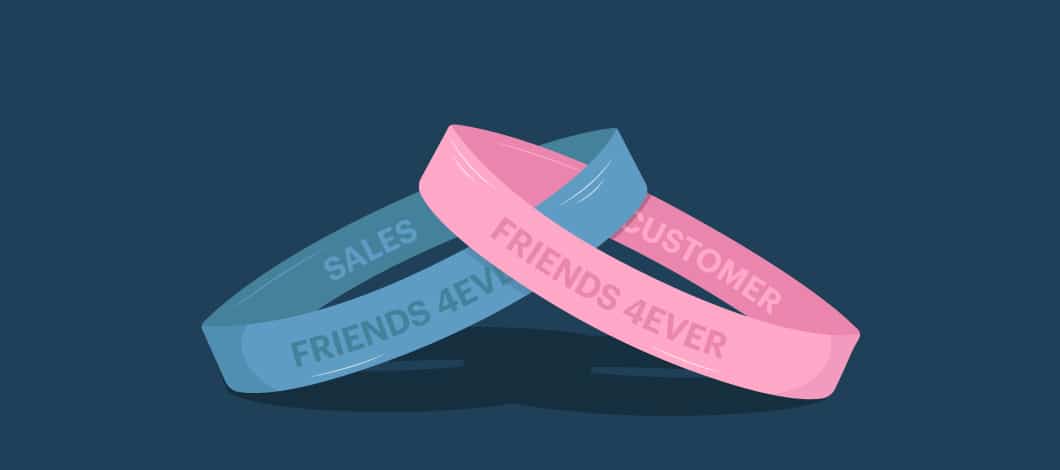Relationship-based sales are rooted in trust. To build relationships with customers, companies must provide a valuable, consistent and dependable experience.
See our tips for relationship-selling success and find out why going the extra mile matters.
What Is Relationship Selling?
Relationship selling is just what it sounds like – building and nurturing connections with prospects and clients to earn a sale.
It’s a technique common in high-value and business-to-business (B2B) sales. When done well, relationship selling can lead to repeat and referral business.
Transactional Sales vs. Relationship Sales
In the conventional sales mindset, the idea is to deliver a strong sales pitch and aim to close the sale. The focus is on the product and the price, and the transaction is a relatively quick one.
In relationship-based sales, the sales cycle may be longer. The aim is to earn a sale (as well as repeated sales and referrals) by building trust and loyalty. Instead of simply conversing with your customer, you’re establishing a connection.
Changing your sales approach from transactional- to relationship-based may not be easy, but it most certainly is advantageous.

How Do You Build a Relationship With a Customer?
We asked a few veteran sales professionals to explain their approach to building relationships with customers. Here are their tips and several key strategies for how to approach the relationship-selling process.
Do Your Homework
Moeed Amin, neuroscience graduate and director and founder of Proverbial Door, a B2B sales training and consultancy, notes, “Most people focus on creating rapport by using their personality. That doesn’t work.”
He offers this advice: “Conduct deep homework on the person you are speaking with. That means understanding the person on 4 levels: 1. What do they fear and desire? 2. Which human needs drive them? 3. What is their social/psychological profile? 4. What are their life and business goals?”
“These 4 are the foundational dimensions for creating a powerful relationship with someone. They help you understand their emotions/feelings, motivations, the needs that drive their decisions and actions and how they view the world and their place within it. The fourth dimension is important to help you understand what they are trying to achieve in their professional life and how that relates to their life goals. Business is one part of someone’s life and for a lot of people, it is not the main emotional motivator.”
Listen to Your Customer
How do you know if your product or service is what your client is looking for? The easiest way is simply to ask and listen. Any issues your customer may have might be easily solved or could reveal any hesitancy or objections. Listening to your customers not only gives you valuable insight but also lets you show your appreciation for their feedback.
Vanessa Kraus, marketing manager at Miller Environmental Group and experienced sales trainer, advises the following: “You want to know what their problem is and then be able to offer a clear, concise and measurable solution. And you don’t just want to listen with your ears. You need to listen with your eyes. Look at the client’s body language – are they open and relaxed? Or tight and reserved with crossed arms?”
“Your job is to be transparent, vulnerable and honest so they get to know YOU and the type of person you are in the world of business. A relationship built on ‘like’ is how you will be able to grow a relationship into ‘trust.’”
Get to Know Your Client
Getting to know your clients beyond their name and position is key in relationship sales. To find out how best you and your product can help them, you need to establish a connection that goes beyond the surface.
Chris Laan, founder of Designer Sheds, shared this: “Every customer is different — the idea of a ‘buyer persona’ is only useful when you cast a wide net. In relationship selling, every sale is a one-to-one conversation. I get to know every customer, and more importantly, I take an interest in their passions.”
“The more you go on about your product or service, the less the customer cares. Fruitful relationship sales come from a mutual interest — if you can’t find that, you’ve got more to discuss,” says Laan.
Show You Care
Demonstrating care is something Todd Miller, sales veteran and president of specialty residential roofing manufacturing company Isaiah Industries, takes seriously. He shares the importance of “…having a genuine love and care for people.”
Miller goes on to say: “Out of that, your selling is done to benefit them, not yourself. That perspective changes everything compared to selling to benefit yourself.”
He also notes, “While relationship selling involves getting to know your customer better than they know you, at some point early on you have to make a firm commitment to them. I suggest doing this through a ‘Personal Commitment’ letter. Printed on nice paper and personally signed in front of the customer or prospect (if possible), this commitment spells out exactly what they can expect from a relationship with you. This may include things like upfront pricing, prompt responses, no surprises, orderly worksite, etc. – all of those things you will consistently do for them that your competitors likely will not be as good at doing.”
If customer appreciation gestures are permitted by your employer, depending on your specific client relationship, you might consider the following:
- Inviting customers out to eat and catch up
- Hosting a client appreciation event
- Inviting clients to special events that would interest them
- Giving customers tickets to an experience you know they’d appreciate
Stay in Contact
One of the keys to relationship selling is nurturing the connection – before, during and after the sale. To that end, continued interactions as well as face-to-face exchanges are vital. Sure, keeping connected on social media and sending emails work well, but what can foster a more meaningful interplay, particularly in times of social distancing and shutdowns?
Thanks to technology, you can keep in contact with your clients via video conferencing, webinars, live stream events, virtual meetings and phone calls. Provide them with valuable information they could benefit from, or just check in to see how they’re doing. Even if your conversations are brief, they keep you memorable and show you care.
-
Spotlight on FC 360’s Finest
While generating a sale through relationship building is vital, it’s just as important to keep the customer by making the effort to provide a quality and shareable experience.
One of the people that consistently goes the extra mile for their customers and prospects is our own Jeff Lesko, a Business Advisor at Fast Capital 360.
Jeff’s been serving our customers for several years and is one of the most consistent generators of 5-star reviews. We wanted to know a little bit more about Jeff’s tips for sales and how his relationship-based sales approach keeps customers engaged and excited to work with him.
How important is it for clients to trust you?
Jeff: It’s extremely important. Once my clients can trust me with the needs of their business, it allows the process to move much faster and it helps us work together to figure out what is best for the business.
What’s the most vital ingredient for establishing trust in a business relationship?
Jeff: For me, it’s just being myself. I don’t feel like people want to speak with a robot or someone who only talks about what is needed for my own personal gain.
I always try to be personable with everyone I speak with and build a relationship. I want the client to feel like they are a friend and that they can reach out to me at any time with any needs at all.
Why Building Relationships Is Important for Business
The importance of relationship-building in sales comes down to showing the customer that you have a vested interest in them beyond their checkbook. It shows you’re willing to go above and beyond to do right by them.
Building trust and rapport takes time, so be patient. Even when there may be pressure to seal the deal, you need to operate on the customer’s timeline. Coming off as pushy and working toward your own agenda can end a sales relationship and ruin months, if not years, of hard work.
The more emphasis you place on producing the best outcome for your customer, the better your customer will be to you and your business over time.
Sure, immediate sales are great – but knowing that loyalty and trust exist between both parties means you’ll be working together on sale, after sale, after sale.












